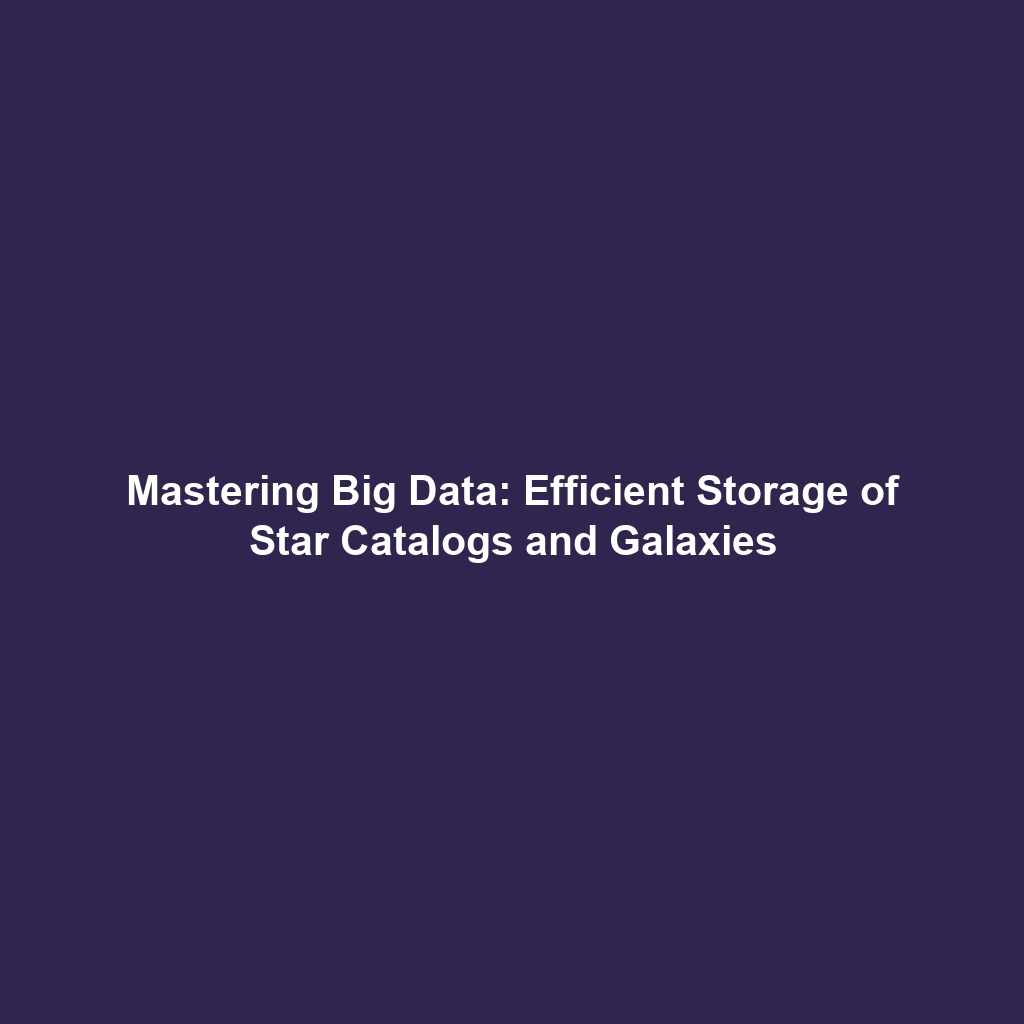Storing and Managing Vast Datasets: Star Catalogs, Planetary Data, and Galaxy Formations
Introduction
In the realm of Big Data in Science, the ability to store and manage vast datasets such as star catalogs, planetary data, and galaxy formations is of paramount importance. As astronomers and scientists seek to understand the universe better, the challenges of handling massive quantities of data continue to evolve. This article delves into the significance of these datasets, highlighting their role in advancing our knowledge and the technological innovations that facilitate their management.
Key Concepts
Understanding Vast Datasets
The primary focus of storing and managing vast datasets is to efficiently handle the enormous amounts of astronomical information generated by telescopes and satellites. Key concepts include:
- Data Storage Solutions: Utilizing cloud computing and distributed databases to store large volumes of data.
- Data Management Tools: Employing advanced software for organizing, retrieving, and analyzing datasets.
- Data Access Protocols: Implementing standards that facilitate the sharing of astronomical data across institutions.
- Data Analytics: Applying machine learning and AI to extract insights from complex datasets.
These principles are essential in the context of Big Data in Science, making it possible to uncover patterns and make predictions about the cosmos.
Applications and Real-World Uses
The study of star catalogs, planetary data, and galaxy formations has numerous real-world applications:
- Astrophysics Research: Analyzing star catalogs to understand stellar evolution and cosmic history.
- Exoplanet Discoveries: Using planetary data to identify potentially habitable worlds in other solar systems.
- Galactic Surveys: Mapping galaxies to study the structure and dynamics of the universe.
These applications illustrate how storing and managing vast datasets is integral to advancing scientific inquiry within Big Data in Science.
Current Challenges
Despite the advances made, several challenges persist in storing and managing vast datasets:
- Data Volume: The sheer scale of data generated by modern telescopes often exceeds current storage capabilities.
- Data Quality: Ensuring the integrity and accuracy of the datasets used for research can be difficult.
- Interoperability: Different data formats and standards can hinder the efficiency of data sharing among scientists.
- Data Security: Protecting sensitive astronomical data against breaches and unauthorized access is crucial.
Addressing these challenges is critical for the ongoing development of effective Big Data in Science strategies.
Future Research and Innovations
Looking forward, several innovations are set to impact the management of vast datasets:
- Quantum Computing: Promises to revolutionize data processing speeds for astronomical datasets.
- Advanced AI Algorithms: Employing more sophisticated machine learning techniques to uncover deeper insights from data.
- Distributed Ledger Technology: Enhances data security and integrity for shared datasets.
These breakthroughs are pivotal for the future of storing and managing vast datasets within the sphere of Big Data in Science.
Conclusion
In summary, the ability to store and manage vast datasets such as star catalogs, planetary data, and galaxy formations is vital for pushing the boundaries of our understanding in Big Data in Science. By addressing existing challenges and embracing technological advancements, the scientific community can continue to explore the universe more effectively. For further reading on data management in astronomy, explore our dedicated pages on Data Analytics in Astronomy and Cloud Storage Solutions.
